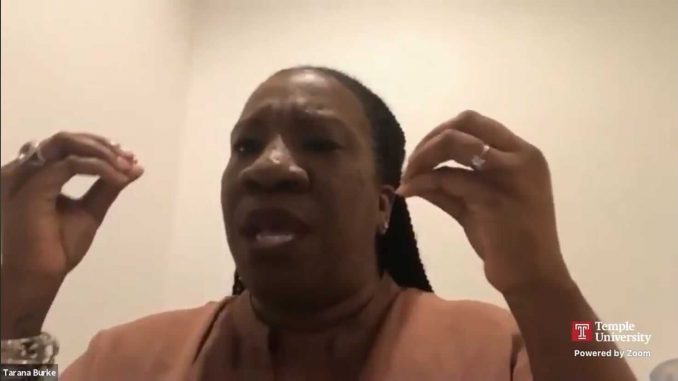
Being intentional about self-care, healing and time for mental recovery is a part of the work those involved in social justice must do, Tarana Burke said.
Burke, an international activist and founder of the Me Too movement, made her virtual visit to discuss her work in combating sexual violence and how students can support survivors. Speaking to about 60 Temple University students via Zoom Thursday night, she discussed topics like the rise of the Me Too movement, participating in social justice work and how to stop sexual violence.
The Wellness Resource Center, Main Campus Program Board, the Office of Institutional Diversity, Equity, Advocacy and Leadership, and It’s On Us TU, a branch of the national campaign that works to end sexual assault in the U.S., hosted the event. Ammani Khan, a senior human development and community engagement major and vice president of It’s On Us TU, led a question-and-answer session with Burke.
“To have that global role model come to you and, you know, give you some hard truths and give you those one-on-one testimonies, I think just is, I mean I’m in awe,” Khan said.
The center hoped the event would share methods of self-care and healing for survivors of sexual assault and harrassment, and actions that can help end sexual violence, said Liz Zadnik, the associate director at the Wellness Resource Center.
Burke founded the Me Too movement nearly 15 years ago to help bring healing to her neighborhood in the Bronx, New York by providing resources to survivors of sexual assault, she said. The movement was amplified by actor Alyssa Milano’s and others’ use of #MeToo on Twitter in 2018 to share stories of sexual violence.
Burke practices self-care by channeling frustration into action and setting boundaries in how she spends her time, she said.
“This is tiring work,” Burke said during the event. “Most of us come to this work because we are the work.”
Burke spoke during the event about people of color’s struggle to get recognition for their work and leadership.
“Your job, if you are an organizer, if you believe in social justice, one of the biggest parts of my job is to clear a path,” Burke said. “What good does that do if my presence doesn’t make people comfortable enough to bring another person who has a better, or deeper, more important, more impactful message?”
Hannah Whitty, a sophomore psychology major, said Burke’s advice was healing and validating as a survivor.
“When you’re in it, you’re a survivor in the healing process,” Whitty said. “Healing isn’t linear, you’re not really sure what to expect on the next part of your journey.”
Main Campus Program Board approached the Wellness Resource Center about the event in April to coincide with International Sexual Assault Awareness Month, but it was postponed due to the COVID-19 pandemic, wrote Madison Cole, a sophomore international business major and co-director of events for MPCB, in an email to The Temple News.
MCPB and the Wellness Resource Center decided to host it virtually this fall so students could hear Burke speak about her activism, Zadnik said.
“We were excited when we were able to reschedule and bring this event to students right now as an opportunity to not only learn from an internationally recognized activist, but also to create a little bit of community,” Zadnik said. “Especially for students who have experiences with sexual assault and harrassment to feel connected and seen and a valued part of the campus community.”
Zadnik felt hosting the event on Zoom enabled participants to be more vulnerable because they could submit questions anonymously.
Some people may also be more comfortable attending virtual events, Cole said.
“It can be more inclusive when you have events online because like people that might have social anxiety or people that might not want to physically come for any type of reason, they can just stay at home on their computer and come to events,” Cole said.
Conversations that pertain to self-care are especially important right now with the Black Lives Matter movement and the COVID-19 pandemic, Zadnik said.
“We really wanted to make sure there was some conversation about self-care,” Zadnik added. “And a spirit of how do we move forward with hope, and with a spirit of sexual assault is preventable, and we can create a world thats free of sexual violence.”
The coordinators wanted to make sure participants were supported and would not feel isolated should they become triggered during the event, Zadnik added, and the Wellness Resource Center made 24/7 hotlines and text chats available during the event.
Cole feels it’s important to address issues of sexual violence even when other issues are getting talked about more often, she said.
“Even though campus is shut down, people are still here, people are still going on campus, so it’s still a very real reality,” Cole added.


Be the first to comment